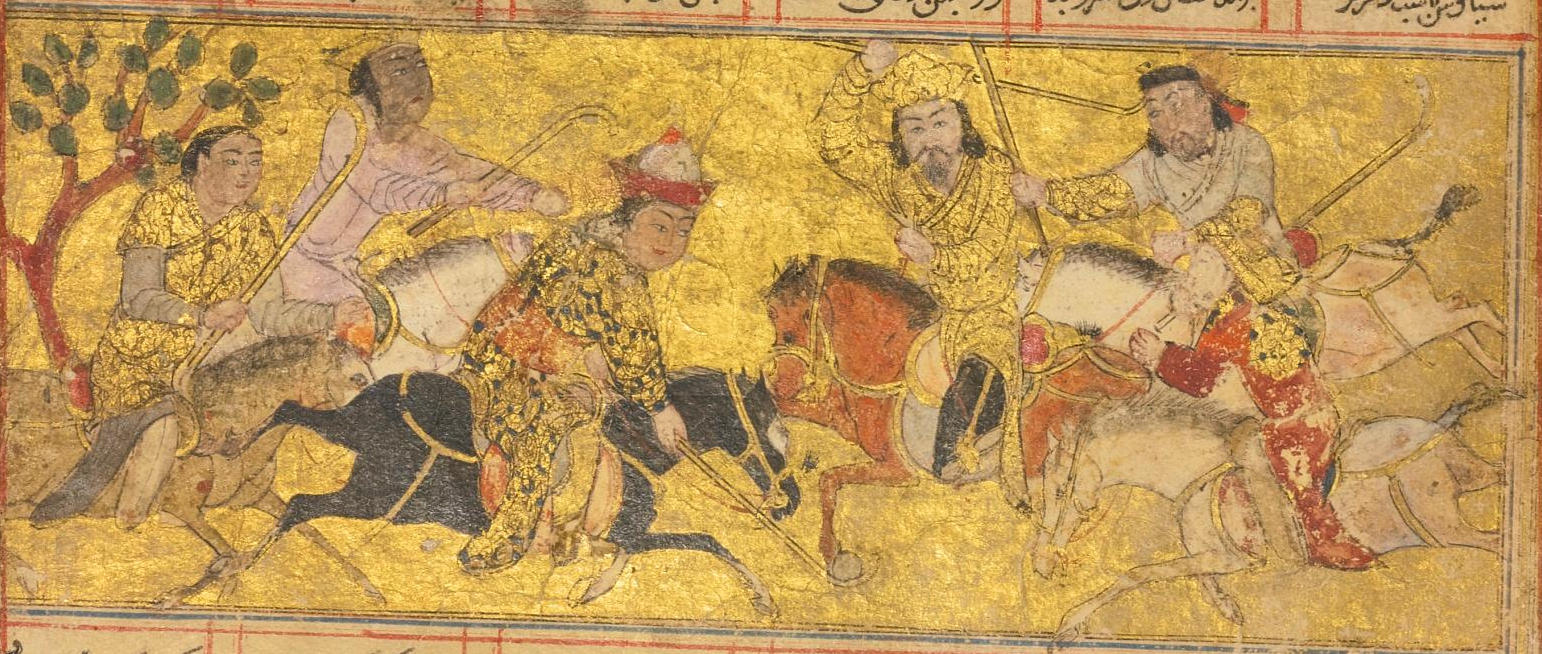
Create an Amazon Business Account
Ilkhanid Illustration
Siyavush plays polo before Afrasiyab
Folio from the 'Second Small Shahnama' (Book of Kings) c.1300AD
Chapter 12d - Siyavush



An illustrated and illuminated leaf from a manuscript of Firdausi's Shahnameh (The Second Small Shahnameh): Siyavash demonstrating his prowess before Afrasiyab, Persia or Baghdad, Ilkhanid, circa 1300.
Estimate 15,000 — 20,000 GBP. LOT SOLD 21,250 GBP
Gouache heightened with gold on paper, 19 lines to the page, written in small naskh script in black ink in 6 columns, red double intercolumnar rules, title in larger gold script, remargined, reverse with 29 lines of text.
Painting: 16.1 by 13.1cm.
Leaf: 25.3 by 18.2cm.
PROVENANCE: H.K. Monif, New York, 1940s, thence by descent.
CATALOGUE NOTE
This folio is from a highly important group of early manuscripts of the Shahnameh known as the Small Shahnamehs. They date from around 1300, and are the earliest surviving illustrated copies of Firdausi's epic, being of enormous art historical significance.
They had long been known and were dispersed in many museum and private collections in the first half of the 20th century, although they were incomplete and fragmentary already by then. The folios from the two manuscripts known as the First and Second Small Shahnamehs were with H.K. Monif in New York, whence the majority of those in North American collections originated, but several had entered European collections by then: a group of 77 folios bearing 80 miniatures is in the Chester Beatty Library, Dublin (see Arberry et al 1959, no.104, pls.4-13), and several are in the British Museum, formerly in the collection of Sir Bernard Eckstein (see Brend and Melville 2010, nos.17-20). The majority of the manuscript known as the Freer Small Shahnameh was with Hagop Kevorkian in New York in the 1920s. The 45 folios in the Freer Gallery, Smithsonian Institution, Washington D.C. were acquired from him between 1929 and 1940.
They have been extensively published and discussed over the last century by many of the leading scholars in this field, including Kuhnel, Binyon, Wilkinson, Gray, Blochet, Minovi, Barrett, Titley, up to Hillenbrand in 1977. The most extensive and thorough investigation and analysis of this group of manuscripts was conducted by Marianna Shreve Simpson in her PhD thesis entitled The Illustration of an Epic: The Earliest Shahnama Manuscripts, presented to Harvard University in 1978. Simpson concluded that the manuscripts were produced in Baghdad around 1300, although Western Persia remained a possibility. In more recent years Sheila Canby, in the catalogue accompanying the exhibition of the Prince Sadruddin Aga Khan Collection at the British Museum, discussed the possibilty of a Herati origin (Canby 1998, p.22). In 2002 Carboni and Komaroff, in the catalogue accompanying the exhibition The Legacy of Genghis Khan, reverted to an attribution of Baghdad or Western Persia circa 1300-1330 (Komaroff and Carboni 2002, nos.33-35, pp.252-3). Most recently Barbara Brend has catalogued four folios as Baghdad 1290s (Brend and Melville 2010, nos.17-20).
Other folios from the Second Small Shahnameh are in the following museums and collections:
The British Museum, London, the Musée d'art et d'histoire, Geneva, the Portland Museum, the Museum of Fine Arts, Boston, the Brooklyn Museum, the Freer Gallery of Art, Smithsonian Institution, Washington D.C., the Montreal Museum of Fine Art, the Honolulu Academy of Arts, the Cincinnati Art Museum, the Keir Collection, Ham, England, the Aga Khan Museum Collection (formerly in the Prince Sadruddin Aga Khan Collection), the L.A.Mayer Memorial Institute for Islamic Art, Jerusalem, McGill University Library, Toronto, the Fogg Art Museum, Harvard University, the Albright-Knox Art Gallery, Buffalo, New York, the Cleveland Museum of Art, the Minneapolis Institute of Arts.
Source: Sothebys. Lot 81, 09 OCTOBER 2013